The Devil—With Wings (7 page)

CHAPTER ELEVEN
Vladivostok
I
N
a café just off the lobby of the Seven Flags Hotel in Vladivostok, Patricia, Bob and Ching sat at a table. A cosmopolitan crowd, made up with samples from half the races of the earth, jangled incessantly and moved restlessly up and down, ever changing, past the lobby door.
It was this which Patricia watched. There was no fire of hope in her eyes now. For five days she had delayed her brother with the faint hope that somehow, some way,
Akuma-no-Hané
had cheated death. The hope had dwindled to a spark which no longer fanned into a blaze when she fed her milling thoughts to it.
“You'd better eat something,” said Bob concernedly. “Gee, you haven't been eating enough to keep a canary alive. And you haven't either, Ching.”
Ching looked downheartedly at Bob and then shifted his weary gaze to Patricia. He saw she was watching the door and he too turned to look. But there was nothing there to hold her eyes except the changing crowd past the entranceway.
He looked back to her. At first he had hated her for what she had caused to happen, but now in his generous heart he could understand. He had tired of chanting to himself that he had been the one who had first brought her to Forsythe. He had wearied of telling himself that he should have sensed the omen held in that first meeting. It had been ordained by the gods from the very beginning that Patricia Weston would kill
Akuma-no-Hané.
No matter how it had been done. She⦠But he knew she was suffering. Everything was unreal to her, hazy, far away.
Bob turned to her. “There's a ship sailing this afternoon. I'm going to take passage on it and get you out of here.” He started to rise but her hand reached up swiftly to catch his sleeve and pull him down again.
“No. He saidâ¦he said to wait.”
Bob was impatient. “We've waited. We've stood on one foot and then the other for five days. I tell you I don't like to hang around. We've got a third of a million dollars left after all the bribes we've had to give and the sooner I get it aboard a ship under the Stars and Stripes, the better I'll feel about it.”
But he sat down again and poured himself a drink. “Aw, I don't blame you, kid. That was a swell thing heâ”
“Shut up,” said Ching, tight-lipped, looking warningly from Patricia to Bob. Ching knew how close the girl was to cracking under the strain.
“Wouldâ¦would he look for us here?” faltered Patricia, eyes never leaving the door.
Ching had answered it for her a thousand times. “Yes. He always comes to the Seven Flags Hotel.”
“Always?” she said, snatching at hope again.
Ching looked down into his glass, conscious of her glance upon him, knowing she was begging him to give her something on which she could peg her confidence.
“There's no chance,” said Bob. “We saw⦔
Patricia suddenly tensed. Her eyes on the door grew wide.
Ching whipped around to look and to be hurled back in his chair by the force of his surprise.
A tall officer with pale yellow hair had stopped in the doorway to the café, to stand and rove his silver gray glance about the room.
His left arm was in a sling and the triangle of cloth almost hid the spreading gold wings of the flying corps and the half-dozen service ribbons on his tunic. Golden globes and anchors were on his collar and on the cap which he held in his right hand.
His face was smoothly shaven but none of the sprucing he had done could hide the tiredness in every line of him.
Suddenly he turned and saw the three at the table. Something happened to him. Life seemed to flow visibly back into him. A glow came to his face and glance as he straightened up and smiled.
He paced happily across the floor with eyes only for Patricia.
Until then she had not dared to be sure. She had never seen his face in full. But now, when she saw him smile and saw him walk, she
knew.
She was crying then. Uncontrollable sobs were shaking her as she reached out and clung to him, pressing her face against his tunic.
His good right arm went around her and held her tightly.
For a long time no one said anything. They could not trust themselves to speak.
Finally Forsythe and Patricia sat down at the table, looking at each other. Ching pushed a drink into Forsythe's hand but Forsythe did not seem to know it was there.
Bob broke the silence. “Hey, how in the hell did you manage it?”
Forsythe did not hear him and Bob had to repeat his question.
“Parachute,” said Forsythe absently, all his attention for the girl.
Ching diverted Bob's attention. “He had everything done in black. For the effect, see? Black parachute. Probably bailed out before they even started to fire. Locked his controls. Nothing to it for⦠Say, by the way,” exclaimed Ching. “You don't even know his name, Patricia. Miss Weston, Captain Forsythe of the Royal Marines.”
That also failed to shake them.
“But it's all over the Orient that you're dead,” said Bob, still doubting the fact that Forsythe was alive.
Forsythe turned and smiled at him. “It's true and yet it isn't true. There's no further use for
Akuma-no-Hané,
Weston.”
“Why not?”
Forsythe's smile broadened as he thought about it. “He's dead. And his work of keeping His Majesty informed of Japanese operations in the Far East is now being very efficiently done by a man who should know best of all.”
“Who?” said Bob.
“By Captain Ito Shinohari of the Imperial Japanese Intelligence.”
“But that can't be,” said Bob. “I just read where they're giving him a medal for killing you. The Order of the Rising Sun!”
Ching and Forsythe suddenly relaxed into a blast of laughter and then, by way of apology, Forsythe said to Patricia, “I passed along data about the man and unless he obeys and gives us intelligence service, he knows he will be forever disgraced. Yes, my work is being done.⦠But it isn't done at all. I've served my time in Intelligence and now I am back to the line. They tell me, Patricia, that I am being ordered to a nice quiet post in
Bombay
.”
She looked at him with a smile which warmed him and sent small thrills of pleasure through him.
In a soft, caressing voice, she said, “I think I shall love Bombay.”
Â
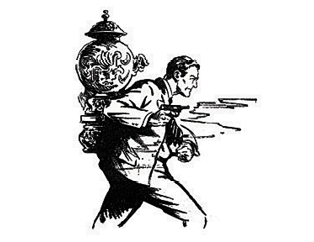 Â
Â
Story Preview
N
OW
that you've just ventured through one of the captivating tales in the Stories from the Golden Age collection by L. Ron Hubbard, turn the page and enjoy a preview of
The Green God.
Join Lieutenant Bill Mahone, who is stationed in the besieged Chinese city of Tientsinâas Mahone starts to realize why the city is under attack, he begins a deadly quest to recover the Green God, a stolen sacred idol. Twists and turns lead inexorably to the grave of one General Tao, and a terrifying secret.
The Green God
S
WIFTLY
Lieutenant Bill Mahone of Naval Intelligence pulled his automatic from its shoulder holster and crawled along the side of the coffin, screening himself from possible guards.
Against the dark sky he could see the outline of the mound which marked the tomb of General Tao Lo, and around it the many unburied coffins which might or might not house the dead of
Tientsin
.
It was a dangerous mission that had brought Mahone venturing into the night. He had convinced his commander that they would not be able to stop the constant looting and murdering that had cast a reign of terror over the city until the Green God was back in its temple.
Tientsin's
Native Quarter
was half in flames; the dead were heaped in the gutters. The Chinese were convinced that their city would fall, now that their idol was gone. Before long these fanatics might sweep into the
International Settlement
and wipe it out.
Mahone had received a slip of paper that one of the natives in the Intelligence Department had brought in. It had been found in the Native Quarter, and the Chinese ideographs had read, “A jade calling card for General Tao Lo.” The general had been dead for a year, but Mahone was convinced that the Green God had been hidden in his tomb.
Now Mahone, disguised as a Chinese coolie, had come alone to try and get the Green God from the general's tomb and save the city before it was too late.
As he crawled along the side of the coffin a cry rang out directly above him and he felt the bite of a knife in his shoulder. With a spring he catapulted away and looked back. A dark figure leaped to follow him! Mahone's automatic spat fire and the shadow by the coffin screamed in agony. In front of him he could see other shadows rising up like ghosts. The faint light fell on the blades of many knives. Vicious snarls were hurled at Mahone as the guards swept down on him.
Knives flashed. The automatic spat again and again. There seemed no end to these fanatics. Bodies hurled their fighting lengths upon Mahone.
With his empty automatic he clubbed and beat about him. He could feel the impact of his steel crashing down upon skulls, arms, bodies. Chinese were sweeping over him in a stifling mass. Knives bit into his flesh like white-hot irons.
He felt men go down upon him, beside him, as he brought his gun butt down. But each time he struck, another screaming demon leaped to take the empty place. His arm was aching with exertion. He was bleeding from many wounds, but he fought on relentlessly.
Feet kicked him in the face, talonlike hands sought his throat, knives lanced in for his heart. His hand was sticky from the blood of crushed skulls.
By rolling over and over he managed to baffle the knives which flashed above him. Suddenly he brought up against a coffin. Then, protected on one side, he tried to gain his feet.
But each time he rose as high as his knees, a body would launch itself into him, pinning him again to the ground. He was partially protected by the inert Chinese he had either killed or knocked unconscious, and hope that he might be able to escape welled up within him.
His left hand fell upon the hilt of a knife and he snatched it up, lashing at the air before him. He felt that blade catch again and again, but each time, he pulled it from the flesh it had met and threshed out for new targets.
The knife blade was growing sticky and he felt a hot trickle of moisture running down inside his sleeve. The salty stench of blood was in his nostrils as he fought.
He was almost exhausted when the rush stopped momentarily.
Â
To find out more about
The Green God
and how you can obtain your copy, go to
www.goldenagestories.com.
L. Ron Hubbard in the
Golden Age of
Pulp Fiction
Â
I
n writing an adventure story
a writer has to know that he is adventuring
for a lot of people who cannot.
The writer has to take them here and there
about the globe and show them
excitement and love and realism.
As long as that writer is living the part of an
adventurer when he is hammering
the keys, he is succeeding with his story.
Adventuring is a state of mind.
If you adventure through life, you have a
good chance to be a success on paper.
Adventure doesn't mean globe-trotting,
exactly, and it doesn't mean great deeds.
Adventuring is like art.
You have to live it to make it real.
â L. Ron Hubbard
L. Ron Hubbard
and American
Pulp Fiction
B
ORN
March 13, 1911, L. Ron Hubbard lived a life at least as expansive as the stories with which he enthralled a hundred million readers through a fifty-year career.
Originally hailing from Tilden, Nebraska, he spent his formative years in a classically rugged Montana, replete with the cowpunchers, lawmen and desperadoes who would later people his Wild West adventures. And lest anyone imagine those adventures were drawn from vicarious experience, he was not only breaking broncs at a tender age, he was also among the few whites ever admitted into Blackfoot society as a bona fide blood brother. While if only to round out an otherwise rough and tumble youth, his mother was that rarity of her timeâa thoroughly educated womanâwho introduced her son to the classics of Occidental literature even before his seventh birthday.
But as any dedicated L. Ron Hubbard reader will attest, his world extended far beyond Montana. In point of fact, and as the son of a United States naval officer, by the age of eighteen he had traveled over a quarter of a million miles. Included therein were three Pacific crossings to a then still mysterious Asia, where he ran with the likes of Her British Majesty's agent-in-place for North China, and the last in the line of Royal Magicians from the court of Kublai Khan. For the record, L. Ron Hubbard was also among the first Westerners to gain admittance to forbidden Tibetan monasteries below Manchuria, and his photographs of China's Great Wall long graced American geography texts.
Upon his return to the United States and a hasty completion of his interrupted high school education, the young Ron Hubbard entered George Washington University. There, as fans of his aerial adventures may have heard, he earned his wings as a pioneering barnstormer at the dawn of American aviation. He also earned a place in free-flight record books for the longest sustained flight above Chicago. Moreover, as a roving reporter for
Sportsman Pilot
(featuring his first professionally penned articles), he further helped inspire a generation of pilots who would take America to world airpower.
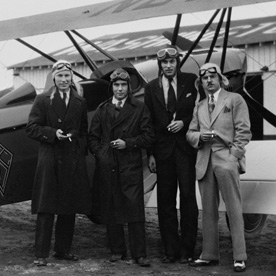 Â
Â
L. Ron Hubbard, left, at Congressional Airport, Washington, DC, 1931, with members of George Washington University flying club.
Immediately beyond his sophomore year, Ron embarked on the first of his famed ethnological expeditions, initially to then untrammeled Caribbean shores (descriptions of which would later fill a whole series of West Indies mystery-thrillers). That the Puerto Rican interior would also figure into the future of Ron Hubbard stories was likewise no accident. For in addition to cultural studies of the island, a 1932â33 LRH expedition is rightly remembered as conducting the first complete mineralogical survey of a Puerto Rico under United States jurisdiction.
There was many another adventure along this vein: As a lifetime member of the famed Explorers Club, L. Ron Hubbard charted North Pacific waters with the first shipboard radio direction finder, and so pioneered a long-range navigation system universally employed until the late twentieth century. While not to put too fine an edge on it, he also held a rare Master Mariner's license to pilot any vessel, of any tonnage in any ocean.
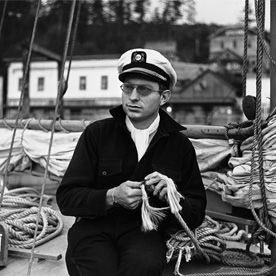 Â
Â
Capt. L. Ron Hubbard in Ketchikan, Alaska, 1940, on his Alaskan Radio Experimental Expedition, the first of three voyages conducted under the Explorers Club Flag.
Yet lest we stray too far afield, there is an LRH note at this juncture in his saga, and it reads in part:
“I started out writing for the pulps, writing the best I knew, writing for every mag on the stands, slanting as well as I could.”
To which one might add: His earliest submissions date from the summer of 1934, and included tales drawn from true-to-life Asian adventures, with characters roughly modeled on British/American intelligence operatives he had known in Shanghai. His early Westerns were similarly peppered with details drawn from personal experience. Although therein lay a first hard lesson from the often cruel world of the pulps. His first Westerns were soundly rejected as lacking the authenticity of a Max Brand yarn (a particularly frustrating comment given L. Ron Hubbard's Westerns came straight from his Montana homeland, while Max Brand was a mediocre New York poet named Frederick Schiller Faust, who turned out implausible six-shooter tales from the terrace of an Italian villa).
Nevertheless, and needless to say, L. Ron Hubbard persevered and soon earned a reputation as among the most publishable names in pulp fiction, with a ninety percent placement rate of first-draft manuscripts. He was also among the most prolific, averaging between seventy and a hundred thousand words a month. Hence the rumors that L. Ron Hubbard had redesigned a typewriter for faster keyboard action and pounded out manuscripts on a continuous roll of butcher paper to save the precious seconds it took to insert a single sheet of paper into manual typewriters of the day.
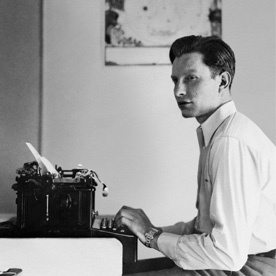 Â
Â
L. Ron Hubbard, circa 1930, at the outset of a literary career that would span half a century.
That all L. Ron Hubbard stories did not run beneath said byline is yet another aspect of pulp fiction lore. That is, as publishers periodically rejected manuscripts from top-drawer authors if only to avoid paying top dollar, L. Ron Hubbard and company just as frequently replied with submissions under various pseudonyms. In Ron's case, the list included: Rene Lafayette, Captain Charles Gordon, Lt. Scott Morgan and the notorious Kurt von Rachenâsupposedly on the lam for a murder rap, while hammering out two-fisted prose in Argentina. The point: While L. Ron Hubbard as Ken Martin spun stories of Southeast Asian intrigue, LRH as Barry Randolph authored tales of romance on the Western rangeâwhich, stretching between a dozen genres is how he came to stand among the two hundred elite authors providing close to a million tales through the glory days of American Pulp Fiction.
 Â
Â
A Man of Many Names
Between 1934 and 1950, L. Ron Hubbard authored more than fifteen million words of fiction in more than two hundred classic publications.
To supply his fans and editors with stories across an array of genres and pulp titles, he adopted fifteen pseudonyms in addition to his already renowned L. Ron Hubbard byline.
______
Winchester Remington Colt
Lt. Jonathan Daly
Capt. Charles Gordon
Capt. L. Ron Hubbard
Bernard Hubbel
Michael Keith
Rene Lafayette
Legionnaire 148
Legionnaire 14830
Ken Martin
Scott Morgan
Lt. Scott Morgan
Kurt von Rachen
Barry Randolph
Capt. Humbert Reynolds
 Â
Â
In evidence of exactly that, by 1936 L. Ron Hubbard was literally leading pulp fiction's elite as president of New York's American Fiction Guild. Members included a veritable pulp hall of fame: Lester “Doc Savage” Dent, Walter “The Shadow” Gibson, and the legendary Dashiell Hammettâto cite but a few.
Also in evidence of just where L. Ron Hubbard stood within his first two years on the American pulp circuit: By the spring of 1937, he was ensconced in Hollywood, adopting a Caribbean thriller for Columbia Pictures, remembered today as
The Secret of Treasure Island.
Comprising fifteen thirty-minute episodes, the L. Ron Hubbard screenplay led to the most profitable matinée serial in Hollywood history. In accord with Hollywood culture, he was thereafter continually called upon to rewrite/doctor scriptsâmost famously for long-time friend and fellow adventurer Clark Gable.
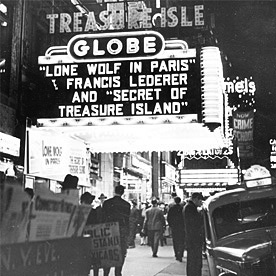 Â
Â
The 1937
Secret of Treasure Island,
a fifteen-episode serial adapted for the screen by L. Ron Hubbard from his novel,
Murder at Pirate Castle
.
In the interimâand herein lies another distinctive chapter of the L. Ron Hubbard storyâhe continually worked to open Pulp Kingdom gates to up-and-coming authors. Or, for that matter, anyone who wished to write. It was a fairly unconventional stance, as markets were already thin and competition razor sharp. But the fact remains, it was an L. Ron Hubbard hallmark that he vehemently lobbied on behalf of young authorsâregularly supplying instructional articles to trade journals, guest-lecturing to short story classes at George Washington University and Harvard, and even founding his own creative writing competition. It was established in 1940, dubbed the Golden Pen, and guaranteed winners both New York representation and publication in
Argosy.